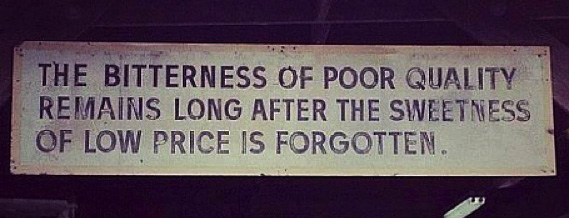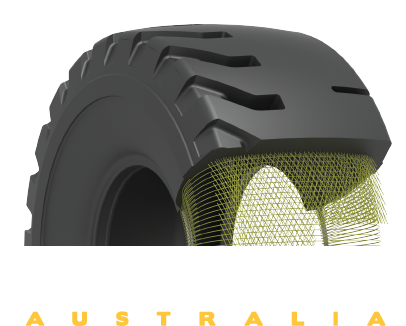TyreInfo
When Quality Matters
Monday, January 09, 2017

There is a saying that sums up the feelings one gets looking back at a purchase or acquisition based solely on price.
When dealing with tyres the importance of this facet of procurement cannot be overstated.
A tyre is a complex machine made up of numerous different components which all have to work harmoniously as a single team, sorry tyre. If any of the component parts do not interact or pull their weight then it’s almost certain that the tyre will fail prematurely, sometimes catastrophically.
I hear the questions already “Procurement has purchased these tyres what can we do, how can we get the most from this poor investment decision?”
Even with a low quality product if the maintenance is high quality then positive benefits may be realised.
The very first thing a tyre needs is the appropriate volume of air to support the load at the given speed. It is expressed in TYRES 101 that the first three rules of tyre maintenance are:
1. Get the inflation levels right
2. Maintain the appropriate inflation levels
3. See rules 1 & 2
Everyone knows a flat tyre does not carry any load, but how many people actually check their tyres before commencing a journey? Most just ASSuME that their tyres are “right”. A quality vehicle inspection program will ensure that tyre pressures are included in the pre start check or that there is a system in place to verify the tyre inflation pressures are in the correct range for example a Tyre Pressure Monitoring System (TPMS).
Even the very best quality tyre will be compromised and degraded rapidly if the inflation pressures are not set and maintained to the expected load and speed requirements. Buying a high quality tyre is not necessarily the answer, but maintaining your tyres goes a long way towards achieving the best returns from the investment made in the tyre(s).
For tyres which endure high loads and possibly high speeds there is another quality that is mostly overlooked. This quality is critical to a tyres success, if the quality is not maintained at acceptable levels then even a well maintained high quality tyre can suffer. The quality of the air delivered to the tyre is most important. Many organisations provide nitrogen systems; at TyreSafe Australia we deliver 95% of those results with less than 20% of the costs.
Nitrogen is usually delivered in bottles or provided on site by a pressure swing adsorption (PSA) unit which extracts the 78% nitrogen from the dirty compressed air delivered by an air compressor.
In the process of extracting the nitrogen all the moisture, oil mist and particulate contamination is removed so that only dry clean gas is delivered. Most smaller commercial PSA units do not deliver the purity of nitrogen required to reduce the risk of explosion to below the threshold required. If the tyre service crew even top up a tyre with normal compressed air all the benefits are lost.
“Why is this so important” is oft asked. I question mechanical maintenance personnel about the quality of oil delivered to a machine. New oil is normally delivered with a 10-micron count. In some cases, lubricating and hydraulic fluids are put through a dialysis (kidney loop) machine which use the same principles as those used for provide clean blood to the human body for those who suffer kidney failure) and then the oils are returned to the machine with a particulate size of less than 2 microns. The advantage gained is that the machines or hydraulic systems enjoy a longer life at a little extra cost.
If dirty air is delivered to a tyre, especially tubeless type tyres, the performance of the tyre will be compromised. Any small amount of hydrocarbon (oil mist from compressors) will attack the halo-butyl rubbers that tyre manufacturers use for the liner (or tube) of the tyre. Any compromise of the liner will permit the inflation medium to permeate through the tyre’s structure to the atmosphere, ergo the tyre needs to be constantly inflated. Moisture forms a different issue for high performance tyres in that when water changes state (i.e. from liquid to gas/steam) it expands in excess of 1600 times.
TyreSafe Australia has direct experience where a 22.5” tyre working at the upper end of its operating range was inflated to 135 psi cold. Using tyre pressure monitoring systems (TPMS) the pressure was observed to be regularly in the 180 – 190 psi range, yet the tyre was not overloaded, nor was the vehicle over speeding.
On inspection of tyres which had been removed from service it became obvious that the quality of the compressed air was such that there was a discernible volume of water delivered on initial inflation and at each subsequent inflation top up. The tyres were being pushed hard, working in the 70O – 90OC range with some going over 100oC by direct tread/belt measurement. The water was simply following what it always does and changing state. Once the quality of the inflation medium was addressed by delivering high quality air the over pressure problems simply disappeared.
If only 43.5 ml of water is included in air used to inflate a tyre then with an expansion ratio of 1600:1, 43.5 ml of water will expand to nearly 74 litres of gas (steam) at 100oC. This is what influences the operating pressures in tyres that are working in the upper reaches of their capabilities.
Quality does not stop at the point of purchase where tyres are concerned. If the maintenance applied to a tyre is not the highest quality available then the tyre user is not gaining the maximum return from the tyre, which leads to a previous question, “why are you throwing money away?”
It makes no cents to ASSuME, remember that monitoring, measuring, maintaining, makes money!
